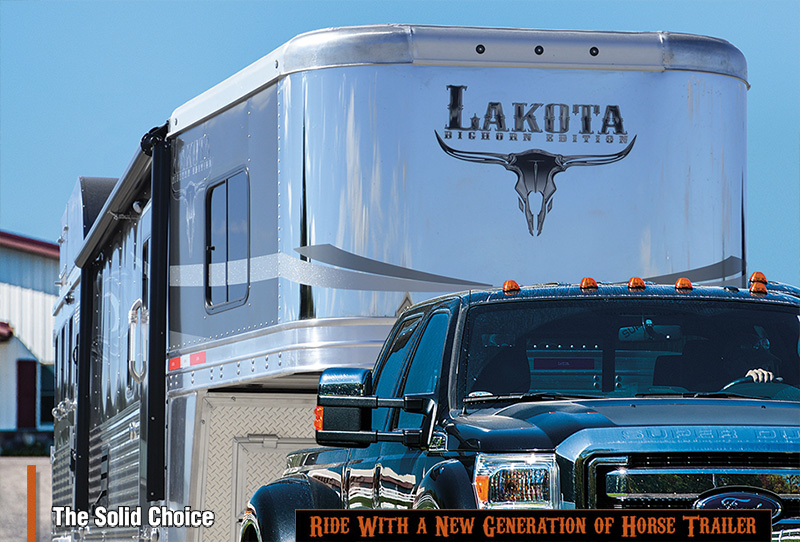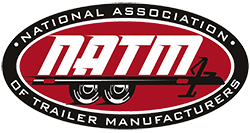In It For The Long Haul

With spring in full swing in most places, a lot of people will begin hitting the road with their equine partners on their way to competitions, trail rides, and rides with friends and trainers. An increasing amount of equestrians have begun travelling long distances to compete, and no matter how hard we try, these trips are always stressful for both you and your horse. Even though long distance traveling may be daunting and even seem risky, there are tons of ways to keep your horse (and yourself) feeling great on the road.
When traveling long distance, preparation, planning, and organization are key to keeping things running smoothly. To prep my horses for travel, I like to give them powder electrolytes in their feed once a day starting a week before we leave. Electrolytes will help them retain more water, and make them more inclined to drink. Keeping your horse (and yourself) hydrated is vital to their well being, especially in situations of high stress. I also keep 2 extra hay bags full at all times when traveling, so when I notice my horse is getting low, it’s easy to switch them quickly. This also takes some stress off of you, because trying to fill your hay bag in a gas station parking lot with an impatient horse banging in your trailer isn’t very fun. Other items you will want to have easily accessible while you travel are paste electrolytes, a small bucket for water, and an equine first aid kit. Not having to dig for these items when you need them will save you time, and take some pressure off.
Something many people struggle with when traveling a long distance is what to put on their horse while they’re in the trailer. I always haul my horses with fly masks on to protect their face and eyes from debris that may fly up off the road, as well as flying hay and shavings. Especially for long distance trips, having a fly mask on is a very good idea. In order to decrease the amount of debris floating around your trailer, keep the bedding to a minimum. You want to make sure you put enough down to be absorbent and provide some traction, but putting too much can make it hard for your horse to balance. This rings true with whatever type of bedding you use, whether it’s straw, wood shavings…etc. Even though it seems like your horse would benefit from more support and cushion when travelling, it’s quite the opposite. They have to work harder and longer to stay balanced in the trailer, so I only put leg wraps on, and I use whatever they’re used to trailering in; whether it be standing wraps, shipping boots, or therapeutic wraps. Leaving them without a sheet or blanket allows them to regulate their own body temperature easily, and keeps them cool when travelling into a hotter climate. If you notice your horses are sweaty, buying a large bag of ice and spreading it on the floor under their belly cools the whole trailer as it melts. Making sure your horses are comfortable keeps them happy, and in turn, healthy!
Once you start travelling, make sure to offer your horse’s water every time you stop for gas. Bringing water from home is the best thing you can do, as it doesn’t have any funky smells or tastes, so you horse will be more inclined to drink. Some horse trailers have water tanks specifically for this purpose. If your trailer doesn’t have an additional water tank, you can purchase a portable tank, flavor your horse’s water with low sugar apple juice, apple cider vinegar, or a sports drink, or you can purchase water filters made specifically for use with horses. These filter out any chemicals or metals that may deter your horse from drinking. If you choose to flavor your horse’s water instead, make sure you begin doing this a few days before you leave so they get accustomed to the taste. When you offer water to your horses while travelling, if they don’t drink, you may want to try to give them a half dose of paste electrolytes. Some horses are difficult with oral syringes, so if that’s the case with your horse, don’t try to force it. Fighting will cause the both of you too much stress and could potentially cause injury. Dosing them once they’re unloaded will be less stressful and much, much safer for both of you.
Depending on the length of your trip, you may need to unload your horses for a period of time to allow them to rest. Most veterinarians recommend unloading your horses every 4 to 6 hours to allow them to stretch, hang their head, and expel mucus. When a horse has their head raised for a long period of time (like they do when tied in a trailer), they are unable to expel the natural mucus that is constantly building up in their sinuses. If they are unable to lower their head and blow this gunk out for an extended period of time, the mucus can run into their lungs and cause a type of pneumonia commonly known as shipping fever. When planning your route, plan the locations that you plan to unload your horses. Look for safe locations near your route that are horse friendly, like parks or waysides that are far off the freeway. Give the horses about a half hour break, allowing them to drink freely and walk around. This is also a good time to give your horse electrolytes if you were unable to while they were loaded. Take this time to relax with your pony and de-stress before getting back on the road!
While planning your route, your biggest enemy is traffic. Do everything you can to avoid it! Plan your route to take you around large cities versus through them, or plan to go through them late at night when there will be the least amount of traffic. Being stuck in a slow down can put a big damper on your trip; with little air movement and your horses in a confined space, they can overheat quickly. If you do get into a traffic jam, do your best to get off the freeway, and while re-routing, either unload your horses or keep driving so they keep cool.
Long distance trips with your horses can seem terrifying, but they can be some of the most exciting travels of your life. No matter how hard you try, there will be things that don’t go according to plan, but when you are prepared and organized, you can tackle any roadblock you come to! The most important thing to do is to remember to go with the flow, take everything in stride, and most important of all, have fun! Good luck to everyone competing this year and may all your travels be safe and memorable!
This article was written by Caitlyn Caby, one of our own Lakota Young Professionals. If you have your own long distance trailering tips, post a picture and use the hashtag #LakotaBlog and #LakotaTrailers so we can share!
Would you like to become a Lakota Young Professional? Click here!
Thanks for checking out the Lakota Blog! Check back in with us next week to see what we’re up too!








